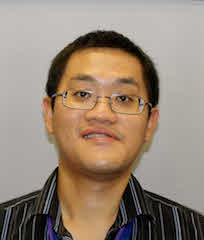July 25, 2016
Postdoctoral fellow appointed to American Society of Tropical Medicine and Hygiene committee

Scott Huang, postdoctoral fellow in the department of diagnostic medicine and pathobiology in the College of Veterinary Medicine, has been appointed to the American Society of Tropical Medicine and Hygiene's American Committee of Medical Entomology. Huang works at the Biosecurity Research Institute with Dana Vanlandingham, assistant professor of virology, and Stephen Higgs, associate vice president for research and director of the BRI.
Huang's research expertise is in mosquitos and mosquito-borne diseases, particularly yellow fever and Japanese encephalitis and how the viruses interact with mosquitos. His primary responsibility on the committee will be to help organize events that facilitate networking and discussion for scientists and boost the careers of entry-level researchers. The events will take place in November at the annual meeting of the American Society of Tropical Medicine and Hygiene in Atlanta, Georgia.
"Huang's work focuses on the interactions between mosquitoes and mosquito-borne viruses with high human and veterinary public health significance," Higgs said. "The results provide critical information and understanding that can be applied to disease control and vaccine development and evaluation. Scott has worked on vector-borne diseases since 2003 and has published 16 papers, 11 of which have been since joining K-State in 2012."
The American Committee of Medical Entomology is a subgroup of the American Society of Tropical Medicine and Hygiene, the largest and oldest international society dedicated to reducing the worldwide burden of tropical diseases and improving global health. The committee promotes medical entomology related to human diseases transmitted by arthropods. The committee recognizes scientific accomplishments through several awards for breakthroughs in entomology, international leadership fellowships and lifetime accomplishments.
The committee has endorsed the Arthropod Containment Guidelines that are widely recognized as the international standard for research that involves arthropod vectors, and committee members recently have published perspectives on use of human participants in vector biology research, have been involved in discussions on Zika virus and have participated in the National Academies review of gene drive systems.
Huang was previously elected as student/postdoctoral trainee representative to the American Committee of Medical Entomology's executive council.
"It's definitely an honor to be elected," Huang said.
